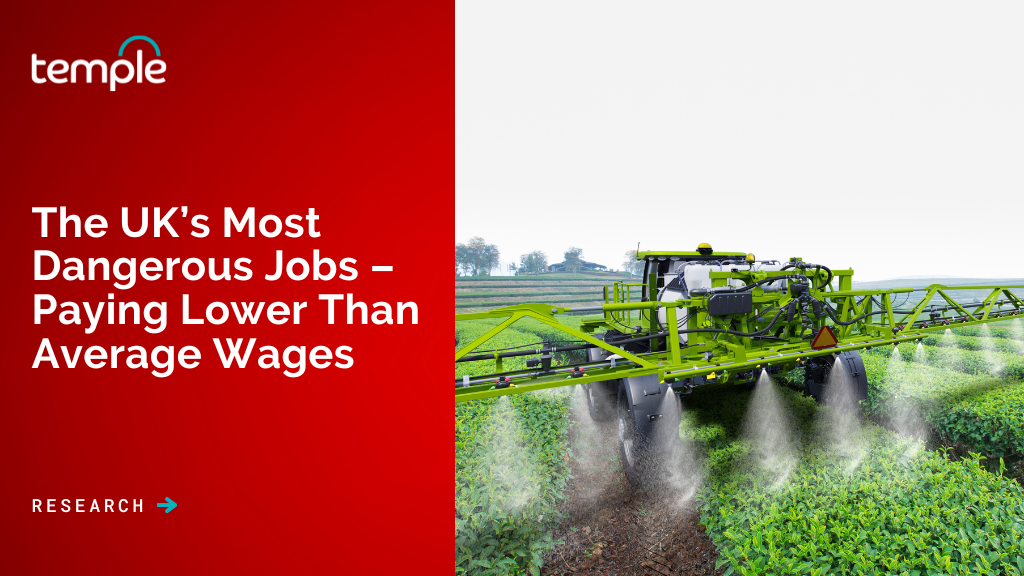
REPORT: How Five Years Shaped the Future of UK Manufacturing
UK manufacturers have demonstrated amazing adaptability during a period of unprecedented major disruption, according to a new report published by Protolabs and the Institute of Mechanical

Essential UK industries that keep the country moving, can sometimes mean life or death for their workers. So, you would hope the salaries adequately compensate for the risk involved, but new research reveals that is not the case.
StaySafeapp.com, the company who conducted the research, analysed the most recent data on workplace fatalities, average salaries for those industries and how many workers there are per industry to compile a list of the UK’s most dangerous jobs.
The most common reasons for fatal workplace accidents in the past year are falls from height (40), struck by a moving object (29) and struck by a moving vehicle (20), which explains why farming takes the top spot for most dangerous. But more surprising, is how dangerous roles such as commercial divers and miners can be, even in 2023.
| Job | Fatality Rate | Average yearly salary |
| Offshore Oil Platform Worker | 52 per 100,000 workers | £33,900 |
| Mining Construction Worker | 42.9 per 100,000 workers | £40,000 |
| Agriculture and Farming | 7.87 per 100,000 workers | £23,867 |
| Commercial Diver | 5 per 100,000 workers | £31,893 |
| Construction and Demolition | 2.10 per 100,000 workers | £37,161 |
| Transport and Storage | 0.98 per 100,000 workers | £28,198 |
| Manufacturing | 0.57 per 100,000 workers | £24,959 |
| Admin and Support Services | 0.41 per 100,000 workers | £23,159 |
| Wholesale, Retail, Motor Repair, Accommodation and Food | 0.28 per 100,000 workers | £22,813 |
| Civil Engineer | 0.21 per 100,000 workers | £42,500 |
| Veterinarian | 0.14 per 100,000 workers | £44,000 |
| Job | Fatality Rate | Average Yearly Salary |
| Agriculture and Farming | 7.87 per 100,000 workers | £23,867 |
| Construction and Demolition | 2.10 per 100,000 workers | £37,161 |
| Transport and Storage | 0.98 per 100,000 workers | £28,198 |
| Manufacturing | 0.57 per 100,000 workers | £24,959 |
| Admin and Support Services | 0.41 per 100,000 workers | £23,159 |
Working with large vehicles, unpredictable livestock and exposure to hazardous chemicals makes working in agriculture the most dangerous occupation in the UK. But with an average salary of £23,867.17, it is well below the national UK average of £30,982.
Farm workers will often be responsible for heavy machinery and work in remote areas of the countryside making it difficult to get help quickly if an accident happens. There are also the long hours they work and in darkness through winter.
Workers in agriculture and farming should take steps to protect themselves from these hazards, such as wearing safety gear, following safety procedures, and being aware of their surroundings.
Coming second in the list is the construction and demolition industry. Although workers are paid over £14,000 more a year on average compared to farm workers, the risk of death or injury is considerably high.
Construction workers are most likely to fall from height on building sites, this could be from incorrectly sited structures such as scaffolding. They are also likely to be struck by moving vehicles if the driver hasn’t seen them on a busy construction site. Another major hazard is accidents involving machinery or equipment, potentially from lack of correct safety training or taking risks to save time on a tight schedule.
The most common fatal accidents in the transport industry come from workers spending so much time on the roads and therefore are at risk from accidents involving other vehicles.
Long hours and a relatively lonely occupation, working in transport can be challenging, especially when workers are dealing with things out of their control like other drivers and the weather conditions. Unloading and loading goods is also a hazard, with many accidents recorded including manual handling injuries and falls from height in warehouses.
Even though they face fewer hazards due to their mainly office-based roles, admin and support services workers still face a higher fatality rate than a lot of industries.
The dangers come from slips and trips at work and, injuries from handling goods such as dropping heavy loads or not using the right equipment. There are even instances of violence from customers or colleagues to deal with.
With the lowest average compensation package in the list at £22,813 a year, those working in these industries face a considerable amount of risk at work, with 15 fatal injuries occurring in the UK in 2023.In 2023, there were 15 fatal injuries in these industries, These are often due to the risks involved with working in confined spaces, with dangerous goods and working long hours.
In these sectors, trips and slips are very common, but also the risks involved when dealing with members of the public make these jobs dangerous. Anyone behind a cash register for example, is at risk from those attempting burglaries.
| Job | Fatality Rate | Average Yearly Salary |
| Offshore Oil Platform Worker | 52 per 100,000 workers | £33,900 |
| Mining Construction Worker | 42.9 per 100,000 workers | £40,000 |
| Commercial Diver | 5 per 100,000 workers | £31,893 |
| Civil Engineer | 0.21 per 100,000 workers | £42,500 |
| Veterinarian | 0.14 per 100,000 workers | £44,000 |
Explosions, fires, falls, and extreme weather conditions are all in a day’s work for an oil rig worker. But their average salary often doesn’t reflect the risk involved in their job.
Workers are responsible for the maintenance and operation of oil rigs in the middle of the ocean. These oil rigs are often equipped with flammable materials, which can explode if they are not handled properly. This can be a very dangerous situation to work in, as explosions can cause widespread damage and injury. Oil rigs can also catch fire, which can be just as deadly.
Offshore oil platforms are often high up in the air, which means that falls can be very serious. The weather in the middle of the ocean can be very extreme, involving high winds, heavy rain, and even hurricanes.
Mining construction workers play an important role in society. They help to extract the resources that we need to build our homes, roads, and other infrastructure.
But unfortunately, they face several hazards on the job, including cave-ins, explosions, exposure to toxic chemicals, and long hours and hard physical labour. Cave-ins are a major hazard in mining, as the ground can collapse without warning. This can be a very dangerous situation, as miners can be buried alive.
Mines often contain flammable gases, which can explode if they are not handled properly. Miners may also be exposed to toxic chemicals on the job. These chemicals can cause a variety of health problems, including respiratory problems, cancer, and skin diseases.
One of the most important jobs in the UK is that of a civil engineer. Responsible for the design and construction of roads, bridges, and buildings. With such big building projects taking place in potential lethal situations such as busy roads and at great height, workers face risks from accidents, injuries, and exposure to hazardous materials.
Civil engineers do benefit from effective measures pout in place to keep them safe such as traffic re-direction, but this still doesn’t make their job risk free. Working with heavy machinery and human error can contribute to their dangerous working environment.
A commercial diver here in the UK will face very different conditions to one who works in a more tropical climate. Our seas are dark and murky and our rivers and lakes dip below freezing. But these divers are responsible for essential underwater construction and repair work.
They face many hazards on the job, including decompression sickness, drowning and, injuries from underwater machinery such as drills and saws. The water in which divers work can be very cold, which can lead to hypothermia. This is where the body’s temperature drops dangerously low, and it can be fatal if it is not treated quickly.
Divers also need to be cautious of decompression sickness, a condition that can occur when divers ascend too quickly from deep water. This can cause a variety of symptoms, including pain, numbness, and paralysis. In severe cases, decompression sickness can be fatal.
When you think of vets you probably think rabbits, puppies, and fluffy kittens, but there are vets who specialise in larger animals. These vets deal with animals who are much larger and heavier and therefore more of a danger when it comes to causing injury.
The average cow weighs in at around 680kg; they might look harmless, but with such weight behind them they have the potential to cause some serious injury. Vets with several years’ experience, who specialise in large animals, can expect to earn around £44,000 per year and there are a total of 29,000 vets in the UK.
These regions have higher fatality rates than the national average of 0.45. It’s likely due to a combination of factors, such as the type of industries that are in these regions, the weather conditions, and the age and experience of the workforce.
Don Cameron, CEO of StaySafeApp.com, said: “One accident at work is one too many, so it’s shocking to see these high figures for injuries and fatalities in these essential job roles. What’s worse is that average salaries are nowhere near what most of us would feel is adequate compensation for the level of risk involved. The industries that this data highlights could, and should, be doing more to protect their workers by ensuring proper safety equipment is issued, and adequate training is provided. It is also important that these at-risk workers have a way to quickly alert their employer if they’re in danger. Lives quite literally will be saved with these actions.”

UK manufacturers have demonstrated amazing adaptability during a period of unprecedented major disruption, according to a new report published by Protolabs and the Institute of Mechanical

The 29th of April 2024 is an important date for IoT manufacturers and anyone selling connected devices in the UK. This brand new and world-leading

Dave Treadwell, VSUK Quality Manager and subregion Coordinator for VSNE covering Holland and Germany, takes us through his experience of becoming a CQI Fellow and

Temple QMS is delighted to be supporting the roll out of new grant funding in the Shropshire region. We will be supporting SME manufacturing businesses